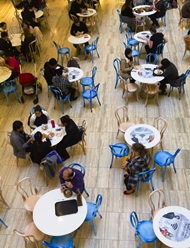22 June 2015
 What makes a society operate in peace, harmony and prosperity – luck, goodwill, strategy and legislation, or a combination of factors?
What makes a society operate in peace, harmony and prosperity – luck, goodwill, strategy and legislation, or a combination of factors?
It’s one of many questions to be explored when UniSA’s International Centre for Muslim and non-Muslim Understanding joins with the Government of South Australia and the University of Adelaide to consider the significance of diversity in our community at the InterculturAdelaide summit on July 9.
Summit convenor UniSA’s Dr Amrita Malhi says InterculturAdelaide will offer important opportunities to consider how notions of multiculturalism that emerged in the 1970s and 1980s have evolved.
“It is 40 years since the demise of the White Australia Policy and the blossoming of Australian multiculturalism – policies advanced to encourage respect for the diversity of the cultural heritage of all Australians - but as we face the challenges of the 21st century, it is time for a new conversation on culture and identity,” Dr Malhi says.
“Our strengthened relationships across the Asia-Pacific region have changed the landscape, but even more significantly, the era of instant global connection has changed the way we do business, the way we form relationships, the information we receive and the way we learn.
“This century conversations about culture explore the development of intercultural relationships and ultimately, notions of global citizenship.”
Dr Malhi says the summit will consider how we engage with high levels of diversity among our Asian neighbours, including India, China and Southeast Asia.
Embedded in the Ninth International Convention of Asia Scholars (July 5-9) at the Adelaide Convention Centre, the summit forms part of a vibrant program, in the largest Asia-oriented event ever held in Australia, set to draw 1000 participants to Adelaide from more than 50 countries.
It will feature panel discussions and a series of open ideas laboratories devoted to key policy areas including education and research, sports and tourism, food and wine, health and other services and a cluster of strategies around inclusion, cohesion, resilience and countering radicalisation.
Keynote speakers at InterculturAdelaide include Prof Prasenjit Duara from the National University of Singapore, Nik Nazmi Nik Ahmad from the Selangor State Executive Council and State Assembly in Malaysia, and Prof Gary Bouma from Monash University, who will examine the relevance of religious and secular diversity and interculturality in our region.
“Strong societies need not only to acknowledge and value diversity but also make connections across groups of people of different cultures and faiths with respect and sensitivity,” Dr Malhi says.
The outcome of discussions at this important summit will be presented to State Government to help inform policy and planning. More information about InterculturAdelaide is available online
Media contact: Michèle Nardelli office: +61 8 8302 0966 mobile: 0418 823 673 email: michele.nardelli@unisa.edu.au


